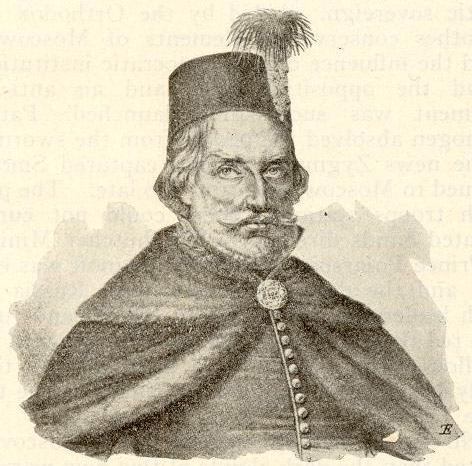Prominent Poles
Stanislaw Zolkiewski, military man, Grand Hetman of the Crown

Born: 1547, Turynka near Lwow, Poland
Died: October 7, 1620, Battle of Cecora near Mohylew, Russia (presently Moldavia)
Summary. Stanislaw Zolkiewski, was a Polish nobleman, magnate and a military commander. He took part in many military operations both in Poland and on its southern and eastern border. He held a number of notable posts in the administration of the Polish-Lithuanian Commonwealth, including the castellan of Lwow (from 1593), voivode of Kijow Voivodship and Great Chancellor of the Crown (from 1618). Following 1588 he was also a Field Crown Hetman, in 1613 promoted to Grand Hetman of the Crown. During his lifetime he won major military victories against Muscovy, the Ottoman Empire and Tatars.
Early days, private life. His father was Stanislaw Zolkiewski, coat of arms Lubicz, voivode of Rus', his mother - Zofia Lipska. Zolkiewski attended schools in Lwów with great distinction, was well read and spoke foreign languages. It is said that he knew all Horace by heart. He married Regina Herburt with whom he had two children: Stanislaw and Katarzyna.
Military career. With his friend Zamoyski he fought under King Stephen Batory in the wars against Tsar Ivan the Terrible. He was secretary to King Batory. Unfortunately, Batory's successor King Sigismund III Vasa was unfriendly to Zolkiewski from the outset; he mistrusted him and would have none of his advice. When the Cossacks began to revolt, Zolkiewski was for treating them gently, but he received orders to put down Seweryn Nalewajko and Toba, the rebel leaders. Between 1594 and 1596 he defeated the Nalewajko's Cossack uprising. Although Zolkiewski knew that the nobles had many just grievances against King Sigismund, yet he came to his aid, and in 1607 defeated the Zebrzydowski's Rebellion in the battle of Guzow. Again he advised the King against war with Muscovy, at the time of the "False Demetrius", as both unjust and impolitic; but, as he says in his famous memoirs, "His Majesty's ears were closed to the hetman's arguments". Ordered in 1609 to lead the army he obeyed, only to find the influence of his enemies and rival everywhere predominant, interfering with the campaign, making him besiege Smolensk against his better judgment, and at last sending him to Moscow with only 6000 men. In 1610 at Kluszyn he met and cut into pieces the army of Szujski, 50,000 strong, entered the city, and, after much parleying with the people and the clergy, made terms by which Wladyslaw (later Wladyslaw IV Waza, King of Poland), King Sigismund's son, was to become Tsar of Muscovy. As an effect of his successful campaign, Zolkiewski seized Moscow and has taken the tsar Vasiliy Shuyskiy captive during the Dymitriads. He supported the election of Władysław IV Waza for tsar and the idea of personal union between the Commonwealth and Muscovy. But even this did not please Sigismund; he reproached Zolkiewski, refused to ratify the agreement, and it became clear that he himself wished to become Tsar of Muscovy. This was an impossibility, and by this refusal all the victories and diplomatic triumphs of Zolkiewski were rendered null, as he pointed out to the Diet at Warsaw, when he returned with the Tsar Demetrius and two of the greatest Russian princes, his captives. The memoirs of his expedition to Moscow, written by himself, are extant, a masterpiece of modesty and sincerity, as invaluable for the history of those times as Caesar's "Commentaries" are for his own. In them we find the sadness of a man whose life has been one long disappointment, striving unsuccessfully and almost alone to hold back the nation that he loves, and that is still mighty, from its impending fall and destruction. Since 1612 he was a teacher and tutor of Stanislaw Koniecpolski, future hetman and military commander. Both in 1612 and 1617 he commanded military campaigns to Moldavia (Moldavian Magnate Wars) and Ukraine. Despite his age (he was over 70), he continued his active service as a military commander until the very end. In 1613 he at last received the grand hetman's staff (withheld from him until then), and went to fight the Turks. In Busza, forced by the superior strength of the enemy, he made a convention with them, for which he was put on his defense in the Diet, and ordeal from which he came forth victorious once more. Zolkiewski was killed on 7 October 1620 during the Polish retreat after the battle of Cecora against the Turks in Moldavia near Prut river. After the battle, his body was desecrated, his head cut off and sent to Constantinople as a war trophy. It was later bought by his widow, together with Zolkiewski's son who was taken captive during the battle. His body was buried in the family church in Zolkiew (now Zhovkva, Ukraine).
Source::
This article uses, among others, material from the Wikipedia article "Stanislaw Zolkiewski" licensed under the GNU Free Documentation License. :
Wikipedia
supplemented with:
Catholic Encyclopedia
Fragment of Zolkiewski's memoirs (in Polish): Poczatek i progress
wojny moskiewskiej
English translation of a fragment of his memoirs:
Constance J. Ostrowski
Return to home page:
Prominent Poles
